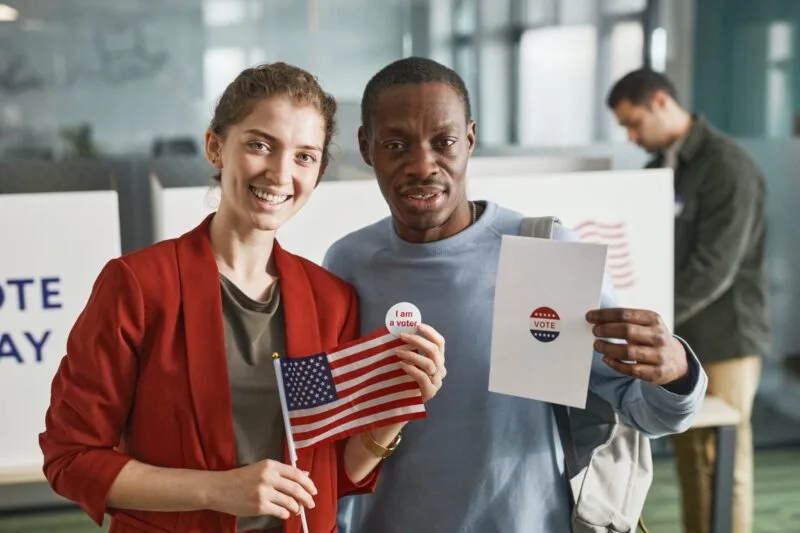
California Has the 10th Highest Level of Political Engagement Among African Americans
With Black History Month and primary season in full swing, the personal finance website WalletHub today released its report on the States with the Highest Political Engagement Among African Americans.
To determine where black Americans are most engaged in the political process, WalletHub compared 49 states across five key metrics. They include black voter turnout and registration during the most recent midterm and presidential elections as well as the proportional representation of black people in the U.S. House of Representatives.
Political Engagement of African Americans in California (1=Most Politically Engaged; 24=Avg.)
Overall Rank: 10th
15th – Black Voter Turnout (2020 Presidential Election)
18th – Black Voter Turnout (2022 Midterm Elections)
23rd – Black Voter Registration (2020 Presidential Election)
21st – Black Voter Registration (2022 Midterm Elections)
“As the 2024 election grows closer, it’s important to make sure that everyone who wants to exercise their right to vote is able to do so,” Cassandra Happe, WalletHub Analyst, said in a statement. There is a historical gap between white and black voter turnout, but some states have done a much better job than others of raising black political engagement to levels comparable with that of white residents.”
Pennsylvania is the state with the highest political engagement among African Americans. Pennsylvania has a track record of strong turnout among black voters, with nearly 71% going to the polls for the 2020 presidential election and nearly 60% for the 2022 midterm elections. The percentage of Pennsylvania members of the U.S. House of Representatives who are black is greater than the overall percentage of the state’s population that is black, too, according to Happe.
Expert Commentary
What accounts for low levels of voter turnout among African Americans?
“There’s strong evidence that voter turnout is closely related to education level and socio-economic status. African Americans, on average, have less education and income for all sorts of historical reasons in this country. But, once you account for these gaps, black Americans are just as likely, if not more so, to turn out to vote as other Americans.”
— Steven Greene – Professor, North Carolina State University
“Black Americans have been disenfranchised first as enslaved people. They then faced legal, societal, and violent countermeasures when Black men were enfranchised after the Civil War, and Black women after the passage of the 19th Amendment in 1920. Even with the passage of the Voting Rights Act in 1965, Black Americans have continued to face disenfranchisement efforts. These factors illustrate that Black Americans are not truly part of this democracy that promises equal treatment and opportunity under the law. When a system is not built for you and continues to try and lock you out, why would you vote? This also relates to the second issue, which is that government policies and priorities often do not reflect the needs and priorities of minoritized people, including and especially Black Americans.”
— Dr. Suzanne M. Chod – Professor, North Central College
What strategies have proven effective in increasing voter participation and civic engagement among African Americans?
“Research shows that community ecosystems are the most effective. When Black community leaders build political networks in the Black community to recruit and fund candidates and mobilize voters, we see success. Parties do not recruit and fund Black candidates at the same rate as white candidates, and the same is true for female candidates. So, if the party is not going to do it, then well-known and well-connected community leaders who look like and stand for Black voters have taken it upon themselves to do it. Ongoing research also suggests that creating a sense of community through celebration mobilizes voters in Black communities. Throughout history, Black Americans have used voting as a way to connect their racial and geographic identities. Therefore, creating social and festive events surrounding voting does increase Black voter turnout in their communities.”
— Dr. Suzanne M. Chod – Professor, North Central College
“The Constitution gives the principal responsibility for organizing voter registration and elections to the states, and some states make the process more difficult than other states do and then it needs to be. For example, most wealthy nations make the registration of eligible voters a government responsibility, while we make it the personal responsibility of the individual voter. We often hold elections on a weekday, usually Tuesday when lots of people are working, rather than on or over the weekend, and we have more local, state, and national elections at different times than other countries do, so voter fatigue is common. So, we could streamline and encourage voter registration, consolidate our elections on fewer days, and hold them over a weekend to ensure more people could take part. It would also help, of course, if the Supreme Court would rein in partisan gerrymandering and the ability of the very wealthy to pump millions and sometimes tens of dollars into elections, convincing many average voters that their participation is inconsequential if not futile.”
— Calvin Jillson – Professor, Southern Methodist University
Why are black people and other minorities underrepresented in political office? For example, there are currently only 4 African American senators, and there have only been 5 black governors in U.S. history.
“It is a little too easy to just say ‘a history of systemic discrimination and inequality,’ but I am not sure how else to better characterize this. The history of awful and overt racism in this country is well documented. It only makes sense that, regardless of current attitudes, this would have a lasting and damaging impact on the black community. Even if there is no racism in current voting, the legacy of this inequality means that many fewer African Americans have the education, experiences, elite social networks, etc., that prove highly advantageous when running for the most prestigious offices, such as governor or senator.”
— Steven Greene – Professor, North Carolina State University
“I think that speaks to the nature of campaign finance and the resources that are necessary to run a successful campaign in America have priced a lot of everyday Americans out of the governance realm. If we look at the economic situation, persons of color are likely to be making less money per year than their white counterparts; which translates to persons of color having the resources (time, money, support) to run for office, much less run a successful campaign. I see campaign finance as the largest barrier to the entrance of more persons of color on ballots, and in office.”
— Emily Stacey, Ph.D. – Professor; Political Science Coordinator, Rose State College
For the full report, please visit: https://wallethub.com/edu/where-are-african-americans-most-least-politically-engaged/19026


